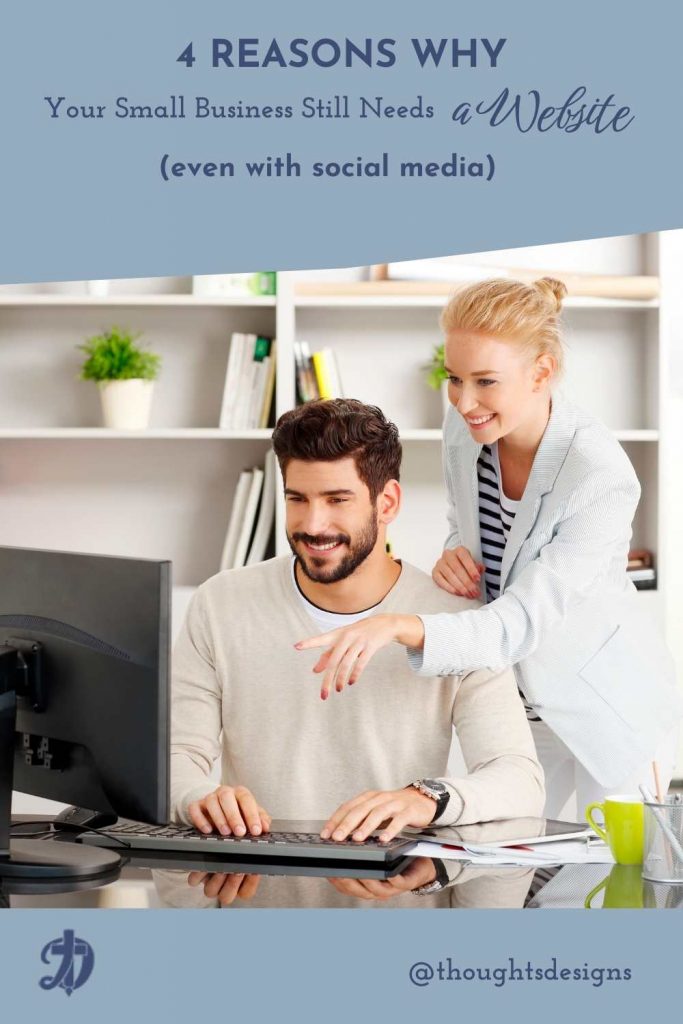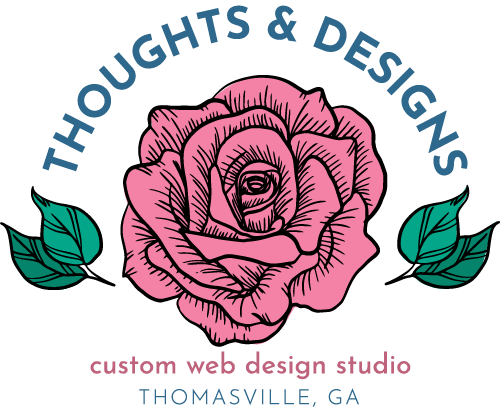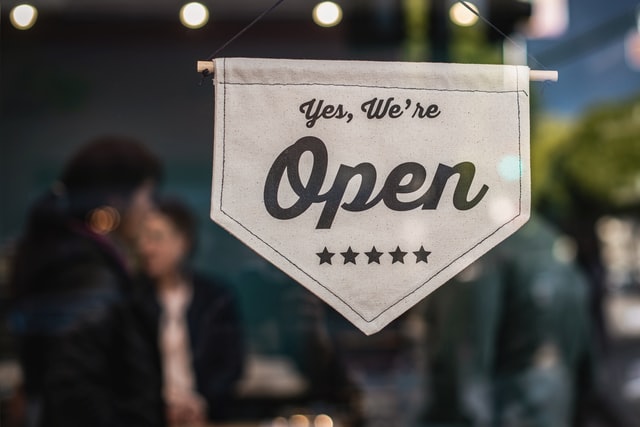With Facebook pages, and every other social media you can think of, you may be wondering whether or not your small business still needs a website.
I would answer that enthusiastically, “Yes!”. Here’s why.
Why Your Small Business Needs a Website: #1 Create a Hub You Own and Control
Maybe it’s my age, but I am continually in awe of modern technology and connectivity. I’m not sure if anyone else sometimes just marvels at how great it is to connect around the world without ever leaving the house.
Social media can be problematic (I avoid it during elections for my own mental and spiritual well-being), but consider this. How incredible is it that we can connect in so many amazing ways (when we are arguing with strangers, anyways)?
Still, this doesn’t mean we get rid of websites altogether.
Let me use an analogy.
Decades ago, I worked as a graphic designer laying out the yellow pages (the business section of the phone book). Even more recently, I was a graphic designer for a newspaper group, laying out ads and designing editorial layout.
Imagine if one of these businesses that still advertise in newspapers decided that the visibility they got from their ads was enough. They didn’t need a storefront. People can just find out what they need from the ad in the weekly paper or annual yellow pages. Right?
That would be foolish. Once someone starts to recognize your business, they need to go somewhere to find out more information – the kind of information that can’t be summed up in a newspaper ad or Facebook post.
As a business owner, your website is your online hub, where you control the narrative. On your website, you highlight what you want your visitors to notice. You organize the information they need to make a buying decision.
On social media, they see blurbs, in a disconnected and disorganized way. They may not even see it, based on how the algorithm is constantly changing.
The visibility from social media can be great and shouldn’t be discounted, but in the end, you direct people to your website for more detailed information to answer all of their questions in a logical and organized way.
Why Your Business Still Needs a Website: #2 for People to Find When they are Looking for a Business like yours near them
When someone is looking into businesses for a need they are having in their area, they are going to Google you first.
Recently, I was trying to figure out which stores near me sold laptop sleeves. I could have ordered from Amazon, but whenever possible I prefer to support small local businesses, so I always check first. But gas is expensive, so I wanted to make sure a store in town had laptop sleeves before I drove there.
So, if someone Googled you, your business, or searched for a business like yours nearby, what would show up for your business in the SERP (Search Engines Results Page)?
This does connect with my first point about why your small business still needs a website. Your website is a hub you control. You get to use it to tell others who you are, and what you are all about.
You control the narrative.
While searching for local businesses in the area, visitors will also conduct a search on Google Maps (or Apple Maps) too, so setting up your profile on Google Business Profile and Apple Maps is also a great idea.
Google may already have you listed, but if you “claim” the listing, you’ll be able to post to it, update and optimize the information for accuracy, and respond to reviews. And, of course, you can direct visitors to your website if they want more information.
Why Your Small Business Needs a Website: #3 Social Media is Constantly Changing
Your small business needs a website because social media companies are constantly changing the rules and how the platforms work.
I’m a big fan of LinkedIn (come connect with me on there!), and they just changed a bunch of stuff again. I do love the new features but it took me some time to get my bearings.
A few years ago, a company I helped with marketing saw a sudden drop in Facebook engagement because Facebook changed the rules of how they decide who sees what posts. Instagram does that too. You can’t control what people see or don’t see when they like and follow your social media profiles, especially as these companies move more towards a pay to play model.
In other words, you can count on your own website because you are in the driver’s seat for the most part. The technology that governs websites changes at a slower pace.
In the last section, I mentioned Google Maps. This is another example of a platform changing the rules without warning.
Google Business Profiles were called Google My Business only a short while ago. The app they had just became deprecated while I was writing this post. No warning. Just bye, bye Google Business app, now you can control it on the Google Maps app. THIS is what I’m talking about right here. I get tons of engagement off my Google Business Profile, so it will be fascinating to see the impact on my business.
Another thing to consider is longevity.
When I was first freelancing, I was getting great engagement and responses on Google Plus. In case you don’t know what that is, it’s a social media site Google had for several years, with a pretty vibrant art and design community on there, and it was one of my favorites, until one day it was no more.
I had foolishly built most of my marketing plan into Google Plus engagement, and now it was gone. That’s partly why I believe so strongly in having a platform of your own – your website – acting as a hub you branch off from when you engage on these other platforms.
Your website will always be your website, even if Facebook or LinkedIn shuts down next year. This is a big reason why your small business needs a website.
Why Your Small Business Needs a Website: #4 Start with social media if you aren’t established
With all that said, you may be surprised to hear this. I don’t believe you should start your business by building your website.
It’s true.
The clients I have had who have succeeded best are those who come into a website or branding project already certain of who they are, who they serve, how they help their ideal customers, and their basic messaging. Your small business needs a website, but it will succeed better if your messaging resonates with your audience.
Messaging obviously changes as you change and grow, learning new things while you serve your fans.
The clients who don’t succeed quite as well or who struggle to get off the ground are those who have never tested their message to see if it resonates with their customers and audience.
In other words, maybe you wrote a bunch of words all alone in your office, waiting for the day when your website is finally done and you can share it with the world. It sounded good to you, and your spouse and mom liked it, so it must be okay.
This is a recipe for disaster.
This is something I had been realizing in my own business. I started out doing web and graphic design. But I soon realized, web design and helping people have successful websites was my passion. I had lots of opinions on it, based on the ways I’ve seen businesses succeed and fail with their websites. But I created my own website based more on graphic design.
Then I was listening to a video by George Kao I bought a group coaching program with him about developing clarity in my messaging. The whole thing was worth every penny. The concept of testing my message on social media, among friends, my audience, and anyone who would listen in small doses to gain better insights as to what resonates with my audience is incredible.
Before you ever get a website, brochures, business cards, and logos…. start talking about it in smaller segments. Test it out. Put it out there. Talk about who you are, what you’re about, and how you serve your ideal customers…BEFORE you ever get a website.
Your website cannot ever be something pretty to dump words into. Your website’s design has to accentuate your messaging, helping it be noticed and received. Therefore, get your messaging solid first, then get a website.
TL/DR

Social Media is an amazing tool, and I have sold on Etsy, Amazon and Ebay before too, but don’t put all your eggs in that particular basket. You don’t control social media or any of the 3rd party platforms. They are useful, but they can’t be your main platform. Build your own platform (your small business website) and use social media to engage with others and direct them to your site for more information. Your small business needs a website, even with social media options available.



